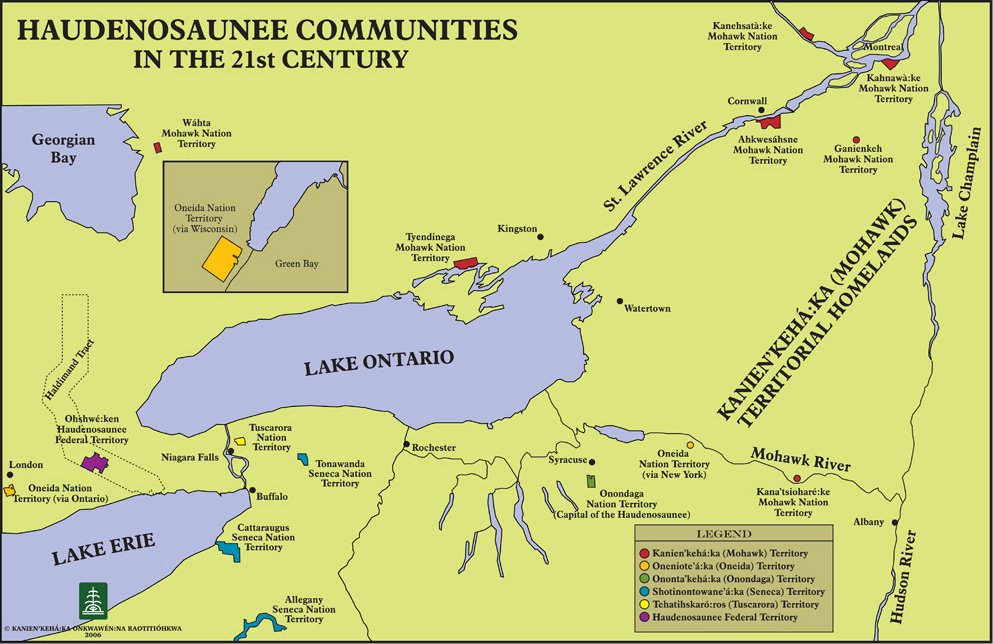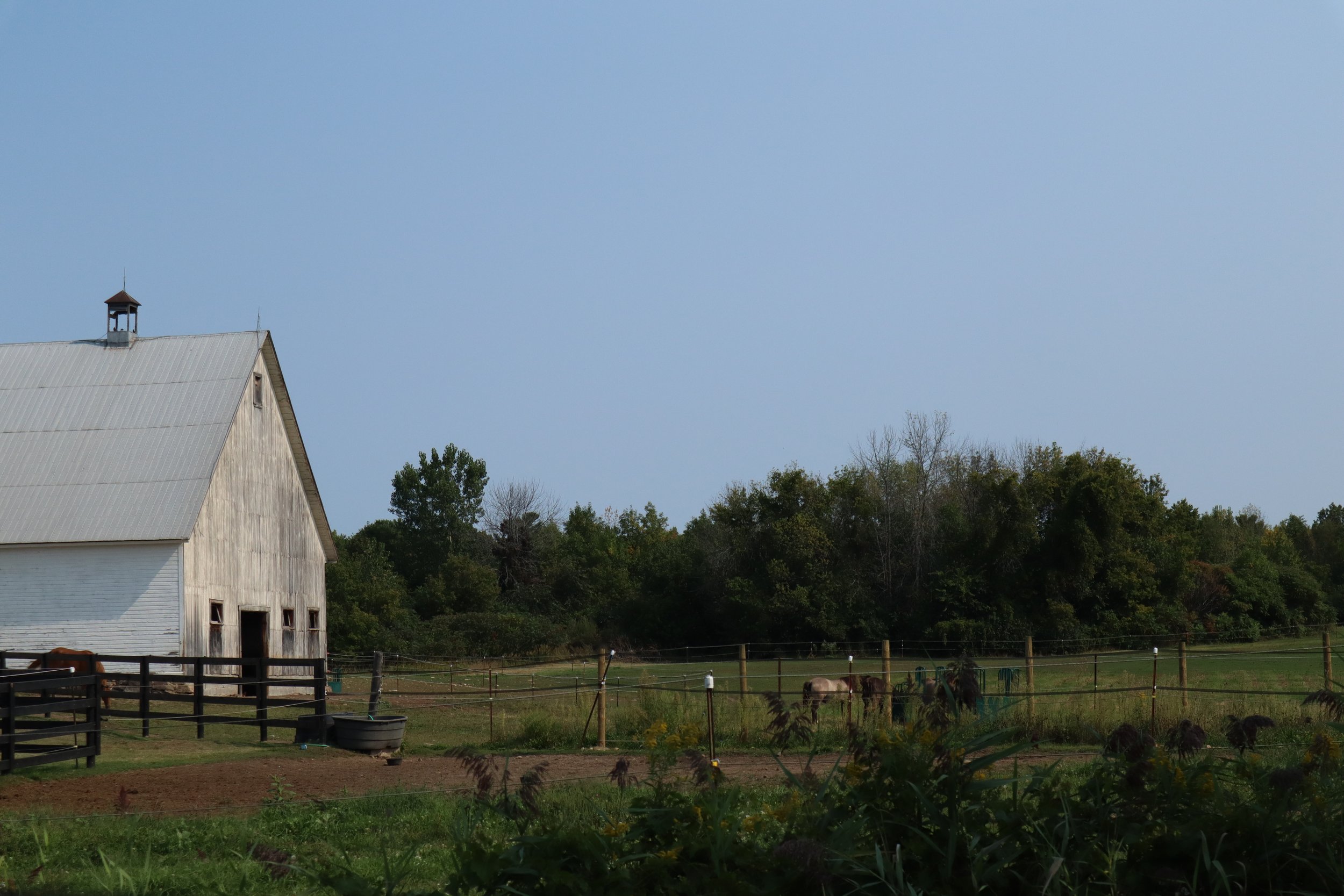Foundation of our strength
Courtesy: Kanien'kehá:ka Onkwawén:na Raotitióhkwa Language and Cultural Center
Story Told by Ellen Gabriel
The impacts of the colonial genocidal project have created divisions and dysfunction within our communities. Centuries of hurt and trauma take time and often the oppression turns within, causing the divisions. In order to create reconciliation within ourselves, Indigenous people must understand their past, their stories of survival and life.
The Papal Bulls of 1493 and the church’s ideology attacked the family unit, our identity and self-esteem, forced us onto ‘reserve lands’ so we didn’t bother the settlers. They brutally oppressed the people of Kanehsatà:ke and normalized the theft of our lands, as all colonizers do in order for them to steal our land and kidnap Onkwehón:we children into work camps they called ‘schools.’ So that we would forget our languages, our culture and our heritage. All to steal our land and as Duncan Campbell Scott said, to beat the Indian out of the Indian.
The foundation of our strength comes from our family, it comes from our Mother Earth, and the colonizer has done everything they can to disconnect us from the land. That’s why it’s so important that the younger generation learn these stories. To understand their history within this colonial project so that they can know how to protect their rights; to protect the land as generations before us have done for us.
In the War of 1812, our people were forced to send our boys and men to fight, some as young as 14 years old. If they refused to send their children, they were threatened by the British to be thrown in jail. This is why I do not believe that we should celebrate our peoples’ participation in this war.
Colonizers like Canada and Great Britain have always used violence against Indigenous Peoples whose resistance to the colonizer in order to protect our families and lands, remains a threat to the settler colonial project.
They do this to discourage Onkwehón:we people and making an example of those who resist - like, this will happen if you do stand up for your rights. Of course, it’s scary because the colonizer has an enormous amount of resources to keep us in survival mode for a long time. We are keenly aware of the tactics used by authorities who are willing to brutalize our people in order to silence us.
While it is normal to feel fear because of the history of violence by the colonizer, it is exactly what makes us human. It’s how you deal with that fear that is important in a way that empowers the people - it helps you stay cautious and careful.
It is important to think ahead, at how your actions will impact you and the cause. Standing up for your rights is important, otherwise someone, or some entity like the government, will feel free to violate your rights and normalize their infringement of your rights.
The meaning behind The Indian Flag. (Courtesy: Ganienkeh & Warrior Society)
KANIEN’KÉHA VERSION
↓
KANIEN’KÉHA VERSION ↓
Onkwa'shatsténhsera' ionitskwaken'seráhkwen
A look at some of the livestock on one of the farms in Kanesatake. (2022) (Courtesy: Simona Rosenfield)
ELLEN GABRIEL IAKOKÁ:RATON
É:so wa'tiakokhahsión:ko' tánon' é:so wa'kakahrhathóhseron' tsi iakwanakerénion ne tsi ní:ioht tsi teionkwaia'tonkò:'on ne kí:ken shakonatonkwehnehstén:ni rontonkwe'tónthos tsi nihonatenoniò:ten. Karì:wes tsi niió:re ienwatéhsa' ne kakarewáhton tsi nonkwá:ti ne oieròn:ke tánon' o'nikonhrà:ke tánon' iotkà:te' kahwihshénhtshera' tenkaté:ni' ne no'nikòn:ra' eh skarátie' teniakokhahsión:ko'. Né: naón:ton' skén:nen aonsaiatión:ni' ontionhahtsherá:kon, ó:nen'k ki' tsi enhoti'nikonhraién:ta'ne' ne Onkwehón:we tsi nihotiia'tawénhseron, tsi nihotikarò:ten's tsi ní:ioht tsi ronatonhnhahnirá:ton.
Taiakotia'tón:ti' ne kahwá:tsire', tsi niiakwaia'tò:ten tánon' tsi ní:ioht tsi tiakwatatéhkhwa' ne thí:ken arihwawa'konhkó:wa rorihwénhton kahiatónhsera' ne 1493 tkáhson' tánon' ne tsi nihonate'nikonhrò:ten ne rotirihwiióhston, kwah nè:'e "tsi nón:we nikanonstáthon" ia'onkwen'terón:ton' né: ki' aó:wen ne tóhsa aiakhiiatsté:riste' ne tehotiniatariià:kon. Wahonte'niakátstate' tsi wa'tehshakonarahsi'tò:rarake' ne Kanehsata'kehró:non tánon' wahontateren'nháhten' tsi rontonhontsáhkhwas, kwah tsi nihotiren'nhà:'on akwé:kon shakonatonkwehnehstén:nis né: wáhi naón:ton' aionkhiionhontsáhkhwa' tánon' tahshakotiià:tahkwe' Onkwehón:we ratiksa'okòn:'a ahshakotiió'tenhste' tsi nón:we iá:ken ratina'tónhkhwa' "tsi ionterihwaienstáhkhwa". Nè:'e wáhi aó:wen ne aonsaionkwa'nikónhrhen' tsi niiakwawennò:ten, tsi niiakwaweiennò:ten tánon' tsi niionkwarihò:ten. Nek aó:wen ne aionkhiionhontsáhkhwa' tánon' tsi nahò:ten' Duncan Campbell Scott rá:wen, "Né: aiaketáhko' onkwehonwéhtshera' ne onkwehón:we rononhahtsherá:kon".
Iakwahwahtsirà:ke nitiawé:non ne onkwa'shatsténhsera' ionitskwaken'seráhkwen, Iethi'nistenhnéha nitiawé:non, tánon' tsik na'tontahatí:iere' ne shakonatonkwehnehstén:ni ne taionkwakhahsión:ko' nonhóntsa'. Kwah nè:'e tiorì:wa' tsi iorihowá:nen ne ken' nithotiièn:sa ahatikaraweientéhta'ne' ne ken' nikakarò:ten's. Né: wáhi ne ahoti'nikonhraién:ta'ne' tsi nihotiia'tawénhseron kanà:skwakon ne kí:ken shakonatonkwehnehstén:ni tsi nihonatenoniò:ten né: ki' wáhi ne ahonaterièn:tarake' tsi ní:ioht tsi aontahatíhnhe' tsi nihotiianerenhserò:ten's; né: aontahatíhnhe' nonhóntsa' tsi ní:ioht ne ohén:ton ronné:tahkwe' tsi niionkhiierà:se'.
Né: 1812 Shiwaterí:io, kwah ok thontaionkwanónhton'se' ia'akhiiaténniehte' nonkwanekenhterónhtshera' tánon' nonkwasken'rakehtáhtshera' nahonterí:io', tohkára nihá:ti nek 14 nithotí:ien'. Tóka' iah thahonathontá:ton iahshakonaténniehte' raotiksà:ta', Tiohrhen'shakahón:we enhonwatihterónhkwen' tsi iontatehnhotónhkhwa' iahonwatiia'tón:ti'. Né: kí:ken tiorì:wa' iah tetkehtáhkhwa' aietewatonhnhà:ren' tsi ón:kwe iakotià:tare' ne waterí:io.
Néne shakonatonkwehnehstén:ni tsi ní:ioht ne Koráhne tánon' ne Tiohrhen'shakahonwè:ke kwah tió:konte' sha'tehshakonateriahtíkhons ne Onkwehón:we nè:'e tsi tontahotinà:khwen' wahshakotiió'tatshe' ne shakonatonkwehnehstén:ni né: ki' wáhi ne aontahatíhnhe' raotihwá:tsire' tánon' tsi ratinakerénion, shé:kon nòn:wa nè:'e tehotì:niote' ne shakonatonkwehnehstén:ni tsi nihonatenoniò:ten. Ken' nihatiiéhrha' ase'kén ronte'niéntha' é:ren ahatihá:wihte' tsi nihotira'sè:se' ne Onkwehón:we tánon' ne ate'nienténhtshera' ahshakonón:ni' ne tsi niká:ien' thotinà:khwens, kwah ken' neniá:wen' tóka' iénhshreke' tsi nisaianerenhserò:ten's. Orihwí:io tsi ióthteron ase'kén nia'té:kon rotí:ien' ne shakonatonkwehnehstén:ni ne tiotkonhón:we taionkwahnió:take' tsi iatióhnhe'. Kwah tokèn:'en ionkwattokahstsíhon tsi niwatenoniò:ten's róntstha' ne ohén:ton rón:nete' néne tsi niká:ien rón:nehre' ahshakotikenhren'serón:ni' ontionkwe'ta'shòn:'a né: ki' wáhi ne tha'taionkwató:take'.
Tsi ioren'nhà:'on naiónttoke' tsi ietshà:nis ase'kén tsi niiorihò:ten tsi nihotiié:ren ne shakonatonkwehnehstén:ni, kwah nè:'e ón:kwe iontión:nis. Nè:'e tkaia'takwe'ní:io tsi ní:ioht tsi enhsié:na' thí:ken katshahnì:kon néne eniako'shatsénhseron' nón:kwe - kwah nè:'e ensaié:nawa'se' ahsatate'nikòn:rarake'. Iorihowá:nen ohén:ton aontahsanonhtónnionhwe', oh nentsisaià:tawen' tsi nénhsiere' tánon' oh nensarì:wawen' nahò:ten' sarihwaio'tátie'. Iorihowá:nen ne iáhshreke' tsi nisaianerenhserò:tens', tóka' iah, ónhka'k tóka' ni' ok na'kaia'tò:ten' kakoráhsera', kwah thieniontatewenní:iohste' enskonwaterihwate'wáhten' tsi nisaianerenhserò:ten's tánon' eniontateren'nháhten' tsi enierá:ta'ne' ne tsi nisaianerenhserò:ten's.
Edited by: Simona Rosenfield, Local Journalism Initiative Reporters
Translated by Karonhí:io Delaronde



